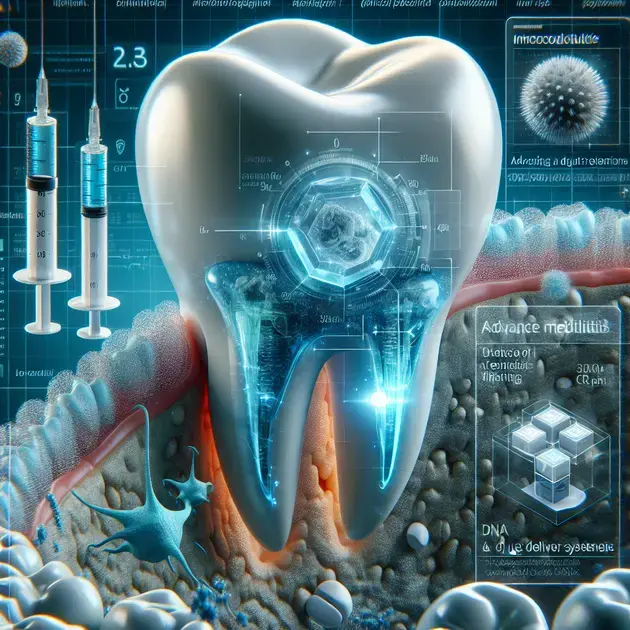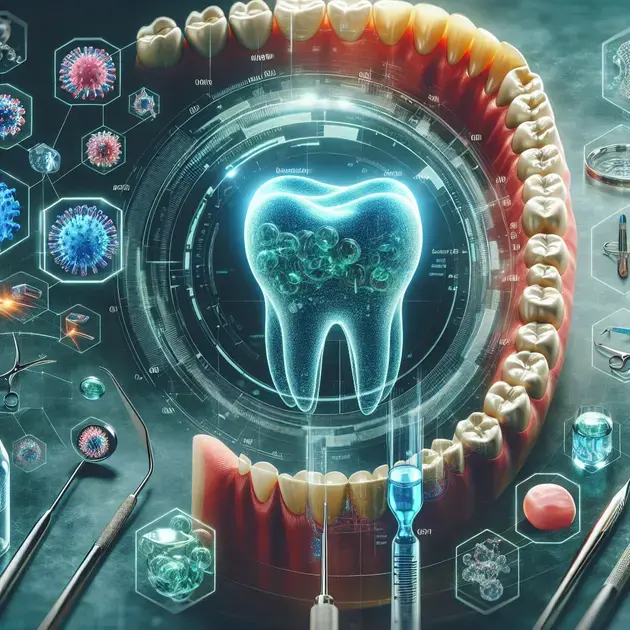When it comes to effectively managing periodontitis, understanding medication options is key. Periodontitis, a common but serious gum infection that damages the soft tissue and destroys the bone that supports your teeth, can lead to tooth loss if left untreated.
Recent advancements in dental medicine have provided a variety of medication options to help combat periodontitis. From antibiotics to antimicrobial mouthwashes, individuals now have more choices than ever when it comes to treating this oral condition. Understanding how these medications work and their potential side effects is crucial in developing a personalized treatment plan with your dental healthcare provider.

Understanding Different Types of Medications for Periodontitis
Periodontitis is a serious gum infection that can lead to tooth loss if left untreated. Understanding the different types of medications available for managing periodontitis is crucial for effectively controlling the disease and preventing further damage to your oral health.
Step 1: Consult with Your Dental Healthcare Provider
When dealing with periodontitis, it’s important to consult with your dental healthcare provider to determine the best course of treatment for your specific condition. Your dentist will evaluate the severity of your periodontitis and recommend the most appropriate medications to help manage the infection.
Step 2: Antimicrobial Medications
Antimicrobial medications, such as chlorhexidine mouthwash, are commonly prescribed to help reduce the bacteria causing the infection in the gums. These medications can help control the growth of bacteria and prevent further damage to the gums and teeth.
Step 3: Antibiotics
In cases of severe periodontitis, your dental healthcare provider may prescribe antibiotics to help fight the infection. Antibiotics can be taken orally or applied directly to the gums to target the bacteria causing the inflammation.
Step 4: Anti-inflammatory Drugs
Anti-inflammatory drugs may also be prescribed to help reduce the inflammation and pain associated with periodontitis. These medications can help alleviate discomfort and promote healing in the affected areas.
Step 5: Follow Your Dentist’s Recommendations
It’s important to follow your dentist’s recommendations when taking medications for periodontitis. Be sure to take the medications as prescribed and attend regular follow-up appointments to monitor your progress and make any necessary adjustments to your treatment plan.
Exploring the Benefits of Antibiotics for Managing Periodontitis
Antibiotics play a crucial role in managing periodontitis by targeting and eliminating the bacteria causing the infection. Exploring the benefits of antibiotics in treating periodontitis can help you understand how these medications work to improve your oral health.
Step 1: Consult with Your Dental Healthcare Provider
Before starting any antibiotic treatment for periodontitis, it’s essential to consult with your dental healthcare provider. Your dentist will assess your condition and determine the most suitable antibiotic regimen based on the severity of your infection.
Step 2: Targeted Bacteria Elimination
Antibiotics work by targeting specific bacteria that are responsible for the gum infection. By taking antibiotics as prescribed, you can effectively eliminate the harmful bacteria and reduce inflammation in the gums.
Step 3: Reduction of Infection Spread
Antibiotics can help prevent the spread of infection to other areas of the mouth and reduce the risk of complications associated with untreated periodontitis. By taking antibiotics, you can contain the infection and promote healing in the affected areas.
Step 4: Enhanced Treatment Efficacy
When used in conjunction with other periodontal treatments, such as scaling and root planing, antibiotics can enhance the overall efficacy of the treatment plan. By combining antibiotics with professional cleanings and proper oral hygiene practices, you can achieve better results in managing periodontitis.
Step 5: Monitoring and Follow-Up Care
It’s important to follow your dentist’s instructions and attend follow-up appointments to monitor your progress while taking antibiotics for periodontitis. Your dental healthcare provider will assess your response to treatment and make any necessary adjustments to ensure the best possible outcome for your oral health.
The Importance of Communication with Your Dental Healthcare Provider
Effective communication with your dental healthcare provider is essential for successful management of periodontitis and overall oral health. By establishing clear and open communication with your dentist, you can ensure that you receive the best possible care and treatment for your condition.
Step 1: Discussing Symptoms and Concerns
When seeking treatment for periodontitis, it’s important to discuss your symptoms and any concerns you may have with your dental healthcare provider. By providing detailed information about your oral health issues, you can help your dentist tailor a treatment plan that meets your specific needs.
Step 2: Understanding Treatment Options
Your dental healthcare provider will explain the various treatment options available for managing periodontitis and discuss the potential benefits and risks of each option. By understanding your treatment choices, you can actively participate in decision-making and collaborate with your dentist to develop a personalized treatment plan.
Step 3: Asking Questions and Seeking Clarification
Don’t hesitate to ask your dentist any questions or seek clarification about your treatment plan or prescribed medications. Clear communication can help you feel informed and confident in your treatment decisions, leading to better outcomes for your oral health.
Step 4: Providing Feedback and Reporting Progress
Throughout your treatment for periodontitis, it’s important to provide feedback to your dental healthcare provider about your progress and any changes in your symptoms. Reporting any concerns or issues promptly can help your dentist make necessary adjustments to your treatment plan and ensure optimal results.
Step 5: Maintaining Regular Follow-Up Appointments
To effectively manage periodontitis and maintain good oral health, it’s essential to attend regular follow-up appointments with your dental healthcare provider. These visits allow your dentist to monitor your progress, address any concerns, and make recommendations for ongoing care to help you preserve your oral health in the long term.

Exploring Potential Medication Advances in Periodontitis Treatment
Periodontitis is a common oral health condition characterized by inflammation of the gums and surrounding tissues. Traditional treatment methods involve scaling and root planing, as well as maintenance of good oral hygiene practices. However, recent advancements in medication have shown promising results in managing periodontitis effectively.
One of the potential medication advances in periodontitis treatment is the use of local antimicrobials. These medications are directly applied to the periodontal pockets, targeting the bacteria causing the infection. By doing so, these medications can help reduce inflammation and promote gum tissue healing.
In addition to local antimicrobials, systemic antibiotics are also being explored for their efficacy in treating periodontitis. These medications are taken orally and can reach bacteria in hard-to-reach areas of the mouth. However, the use of systemic antibiotics requires careful consideration to avoid antibiotic resistance and other potential side effects.
Furthermore, researchers are investigating the use of host modulation therapy in periodontitis treatment. This approach aims to modify the host response to bacterial infection, allowing for better resolution of inflammation and tissue regeneration. By targeting the immune response, host modulation therapy can enhance the effectiveness of traditional periodontal treatments.
Overall, exploring potential medication advances in periodontitis treatment offers new opportunities for more targeted and effective management of this common oral health condition. By leveraging these advancements, healthcare providers can improve treatment outcomes and enhance the overall oral health of patients.
Effective Strategies for Administering Medications for Periodontitis
Administering medications for periodontitis requires a multi-faceted approach to ensure optimal effectiveness and patient compliance. Healthcare providers can utilize the following strategies to enhance the administration of medications for periodontitis:
1. Patient Education:
Educating patients about the importance of medication adherence and proper administration techniques is crucial for successful treatment outcomes. Healthcare providers should explain the purpose of the medications, potential side effects, and instructions for use in a clear and accessible manner.
2. Personalized Treatment Plans:
Developing personalized treatment plans based on the specific needs and preferences of each patient can improve medication adherence. By considering factors such as dosage frequency, medication form (e.g., oral tablets, topical gels), and lifestyle constraints, healthcare providers can tailor treatment regimens to maximize patient compliance.
3. Routine Monitoring and Follow-Up:
Regular monitoring of patients receiving medications for periodontitis is essential to assess treatment progress and address any concerns or side effects promptly. Healthcare providers should schedule follow-up appointments to evaluate the effectiveness of the medications and make adjustments as needed.
4. Behavioral Support:
Offering behavioral support and motivational techniques can help patients stay motivated and committed to their medication regimen. Healthcare providers can provide encouragement, address barriers to adherence, and offer resources for additional support to empower patients in managing their periodontitis effectively.
5. Multidisciplinary Collaboration:
Collaborating with other healthcare professionals, such as pharmacists, periodontists, and dental hygienists, can enhance the coordination of care and support comprehensive treatment approaches for patients with periodontitis. By working together, healthcare providers can optimize medication administration and improve patient outcomes.
Enhancing Periodontitis Management Through Medication Optimization
Medication optimization plays a crucial role in enhancing the management of periodontitis and improving treatment outcomes. By focusing on optimizing the use of medications for periodontitis, healthcare providers can achieve better control of the condition and promote long-term oral health.
One strategy for enhancing periodontitis management through medication optimization is the use of combination therapy. By combining different medications with complementary mechanisms of action, healthcare providers can target multiple aspects of the disease process simultaneously, leading to improved clinical outcomes.
Furthermore, incorporating innovative drug delivery systems can enhance the effectiveness of medications for periodontitis. Controlled-release formulations, such as bioadhesive gels and medicated inserts, can provide sustained drug release at the site of infection, prolonging the therapeutic effects and reducing the need for frequent administration.
Another aspect of medication optimization in periodontitis management is dose adjustment based on individual patient responses. Healthcare providers should closely monitor the efficacy and tolerability of medications and adjust the dosage as needed to achieve optimal treatment outcomes while minimizing the risk of adverse effects.
Moreover, staying informed about the latest research and developments in periodontitis medication can help healthcare providers make informed decisions about treatment strategies. By keeping up-to-date with emerging therapies and evidence-based practices, providers can offer the most effective and innovative treatment options to their patients.
In conclusion, enhancing periodontitis management through medication optimization entails a comprehensive and patient-centered approach to medication use. By implementing effective strategies, staying proactive in optimizing medication regimens, and staying abreast of advancements in the field, healthcare providers can elevate the standard of care for patients with periodontitis and improve their overall oral health.
Conclusion
Exploring potential medication advances in periodontitis treatment has unveiled promising opportunities for managing this common oral health condition more effectively. The use of local antimicrobials, systemic antibiotics, and host modulation therapy represents significant strides in targeting the root causes of periodontitis and promoting tissue healing. These advancements offer healthcare providers novel tools to enhance treatment outcomes and elevate overall oral health for patients.
Effective strategies play a key role in administering medications for periodontitis successfully. From patient education to personalized treatment plans, routine monitoring, behavioral support, and multidisciplinary collaboration, a comprehensive approach ensures optimal effectiveness and patient compliance. By implementing these strategies, healthcare providers can empower patients to manage their periodontitis effectively and achieve better treatment outcomes.
Enhancing periodontitis management through medication optimization is essential for improving treatment efficacy and long-term oral health. By employing combination therapy, innovative drug delivery systems, and dose adjustments based on individual responses, healthcare providers can target multiple disease aspects, prolong therapeutic effects, and minimize adverse effects. Staying informed about the latest research and advancements allows providers to offer the most innovative and effective treatment options to their patients.



